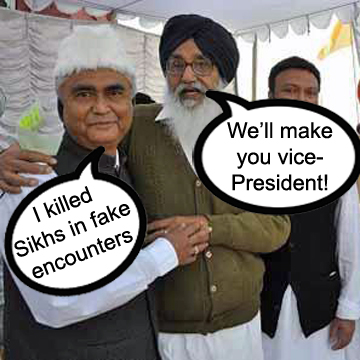Last week it was revealed that the Shiromani Akali Dal (Badal) – the premier Sikh political party and present day Punjab State Government – had invited former DGP Izhar Alam to become it’s Vice President. Alam gained notoriety for his alleged role in eliminating vast numbers of Sikh youths in Punjab during the mid-late 1980s and has been associated with the Akalis in recent years in similarly controversial circumstances. What does his appointment mean for Sikhs and what does it say about the political state of play in Punjab today?
Following the Indian invasion of Darbar Sahib Amritsar in 1984, tens of thousands of Sikhs took up arms against the State in open rebellion. Termed both militants and separatists the World over, the reality was that many Punjabis felt they had no other option than to take up arms to defend themselves, comprising predominantly Sikhs whose way of life was the intended target of international military operations Bluestar and Woodrose. The central Government’s response was a continuation of those campaigns at all levels of society and under the likes of senior policing figures such as Kanwarpal Gill, the brutal clampdown of Sikhs in Punjab intensified. Human rights abuses became commonplace as did fake Police-encounters in which everyday Sikhs were murdered whilst supposedly engaged in combat with the authorities (they mostly weren’t).
At that time, Izhar Alam “assembled a large, personal paramilitary force of approximately 150 men known as the ‘Black Cats’ or ‘Alam Sena’ (‘Alam’s Army’) that included cashiered police officers and rehabilitated Sikh terrorists. The group had reach throughout the Punjab and is alleged to have had carte blanche in carrying out possibly thousands of staged ‘encounter killings’.” This latter statement of Izhar Alam’s crimes are not my own words or that of any other author/academic, but the content of a leaked US diplomatic cable from the American Embassy in Delhi no less, published on Wikileaks. With such a reputation, you’re probably wondering why this very same Alam was last week appointed Vice President of the Shiromani Akali Dal (Badal), a Sikh political party with a rich history of fighting against oppression whether it was leading the line at the reclaiming of historic Sikh shrines, vocalising the movement for Punjabi Suba, or courting arrest during the Dharam Yudh morcha. The answer lies with us, Sikhs, both in Punjab and in the Diaspora and our deviation from Khalsa principles of governance and social justice that has allowed the lunatics to take over the asylum unchallenged.
In the three decades that have followed since the events of 1984, Sikhs have largely existed in a state of complete and utter chaos. That is to be expected for despite the repeated suffering in our short history, both the invasion and the Genocide that followed the assassination of Prime Minister Indira Gandhi (itself a glimpse at what would have taken place had she lived to order Operation Shanti) were acts perpetrated upon the Sikhs for the first time by forces that were not deemed to be foreign entities. For all but a few insightful Sikhs who foresaw the danger of an increasingly unstable Hindu right, the friendly neighbours of Delhi turned into oppressive savages practically overnight leading to a crippling emotional state of mind which continues to afflict far too many Sikhs. For example, even to this day, we allow ourselves to be sideblinded with questions over the occupancy of the Darbar Sahib, or debating the call for a separate Sikh state, whilst Indian Military Operations have transitioned into their next phase, focusing on generating social disconnection from the issues and cultural amalgamation of Punjab into ‘Mother India’. Throughout this time, the Badal faction has continued to operate outside of the chaos just as it did in the years leading up to 1984, putting into action a plan that is ruthlessly devised to serve singular aims. Following their unprecedented Punjab re-election in 2012 and the abject failure of Sikhs worldwide to sustain momentum gained during the #iPledgeOrange movement, it was only a matter of time before the Badal-led Shiromani Akali Dal would test the water with an act flexing their muscular, unchallenged superiority.
Sikhs in Punjab have had an unfathomable amount to contend with since the partition of Punjab, and so removed from the daily battleground, one would have hoped for greater leadership coming from western Sikh groups. Largely, the Panthic response in the Diaspora in recent decades has been one of frustration, bereft of long-term strategy and unable to recognise both the problems that we have been facing and their next guise. Partly this has been due to State infiltration at all levels of Sikhdom, whilst in some cases it is the result of sheer ineptitude and inability on our part. Both elements reflect our degeneration, but can be rectified IF we are willing to work at becoming Sikhs once more – students of the Guru, engaged in discourse of the Shabad and dedicated to emancipation through betterment of the World we live in. However, much more difficult to remedy is the biggest contributing factor of all, that of widescale Panthic apathy. In the last two years alone, western-born Sikhs showed that they too had the zeal to fight oppression that was so inbred it had led to the UN and states like the United Kingdom classifying Sikhs as a ‘race’ and not simply a religion. But sadly those roars of solidarity were short-lived, perhaps intentionally so from some quarters of Sikh leadership, and the snarls of lion cubs which promised so much have disappeared without so much of a whimper. As with so many other causes taken up by westerners, the campaigns of the last 30 months (Rajoana, Professor Bhullar, Gurbaksh Singh) were lesser signs of an awakening Sikh nexus, and more statistical victims of what is called ‘slacktivism’. It is in this light that the appointment of an alleged mass-murderer of Sikhs to the position of Vice President of a ruling Sikh political party must be seen; it is a declaration of the ruling elite, personified in Punjab by Messrs. Badal & Son, that there is no credible opposition to their hegemony.
The question before us thus is not one of how this eventuality has been permitted to occur, or how it could yet be prevented (please God not another petition), but what possible move Sikhs could yet make with the long term in mind (I have shared my thoughts in answer of this question previously). Could it be that it is time to accept defeat in the present duel? Maybe not, but the current situation would suggest that nobody is left on the Panth’s side of the table in any case. Defeat by default? A true disgrace if ever one was to befall those who serve the House of Guru Nanak… in all humility I beseech the rider of the blue horse, help us.





